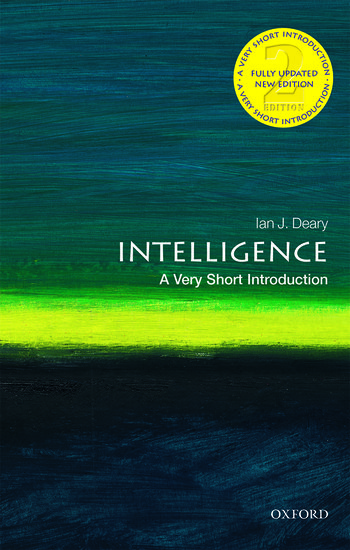Home >
A Very Short Introduction >
Intelligence (2nd edition) (Psychology)
A Very Short Introduction | Psychology
Intelligence (2nd edition)
ISBN: 9780198796206
Series: A Very Short Introduction
Intelligence (2nd edition) (Psychology)
A Very Short Introduction Intelligence (2nd edition) (Psychology) Media > Books > Non-Fiction > Education Books Expect Delays of Up to 4 Weeks| Order Below |
ISBN
9780198796206 (10-digit ISBN: 019879620X)
- Description
- Key Features
- Series Description
- Table of Contents
- Describes what psychologists have discovered about how and why people differ in their thinking powers
- Includes a new chapter on sex differences in intelligence
- Considers the new field of cognitive epidemiology, which draws links between intelligence and better health, less illness, and longer life
- Includes new work on DNA testing and intelligence genetics
Some people are cleverer than others. This everyday observation is the subject of an academic field that is often portrayed as confused and controversial, when in fact, the field of intelligence holds some of psychology's best-replicated findings.
This Very Short Introduction describes what psychologists have discovered about how and why people differ in their thinking powers. Drawing on large scale data Ian Deary considers how many types of intelligence there are, and how intelligence changes with age. Along the way he tackles some of the most burning questions surrounding intelligence, such as whether larger brains are cleverer, and how genes and environments contribute to people's intelligence differences. He also considers the new field of cognitive epidemiology, which draws links between intelligence and better health, less illness, and longer life, and asks whether intelligence is increasing. In this new edition Deary also addresses the controversial question of whether men and women differ in intelligence. Throughout he provides a clear description of the data we can use to answer these questions and more.
Oxford's Very Short Introductions series offers concise and original introductions to a wide range of subjects--from Islam to Sociology, Politics to Classics, Literary Theory to History, and Archaeology to the Bible.
Not simply a textbook of definitions, each volume in this series provides trenchant and provocative--yet always balanced and complete--discussions of the central issues in a given discipline or field. Every Very Short Introduction gives a readable evolution of the subject in question, demonstrating how the subject has developed and how it has influenced society. Eventually, the series will encompass every major academic discipline, offering all students an accessible and abundant reference library.
Whatever the area of study that one deems important or appealing, whatever the topic that fascinates the general reader, the Very Short Introductions series has a handy and affordable guide that will likely prove indispensable.
Please note: As this series is not ELT material, these titles are not subject to discount.
1: Preface and acknowledgements
2: What happens to intelligence as we grow older?
3: Are there sex differences in intelligence?
4: What are the contributions of environments and genes to intelligence differences?
5: Are smarter people faster?
6: What do more intelligent brains look like?
7: Does intelligence matter in the school and the workplace?
8: Does intelligence matter for good health and long life?
9: Is intelligence increasing generation after generation?
10: Do psychologists agree about intelligence differences?
Further reading
Appendix: An explanation of Correlation and Meta-analysis
Index
Some people are cleverer than others. This everyday observation is the subject of an academic field that is often portrayed as confused and controversial, when in fact, the field of intelligence holds some of psychology's best-replicated findings.
This Very Short Introduction describes what psychologists have discovered about how and why people differ in their thinking powers. Drawing on large scale data Ian Deary considers how many types of intelligence there are, and how intelligence changes with age. Along the way he tackles some of the most burning questions surrounding intelligence, such as whether larger brains are cleverer, and how genes and environments contribute to people's intelligence differences. He also considers the new field of cognitive epidemiology, which draws links between intelligence and better health, less illness, and longer life, and asks whether intelligence is increasing. In this new edition Deary also addresses the controversial question of whether men and women differ in intelligence. Throughout he provides a clear description of the data we can use to answer these questions and more.
Key Features
- Describes what psychologists have discovered about how and why people differ in their thinking powers
- Includes a new chapter on sex differences in intelligence
- Considers the new field of cognitive epidemiology, which draws links between intelligence and better health, less illness, and longer life
- Includes new work on DNA testing and intelligence genetics
Series Description
Oxford's Very Short Introductions series offers concise and original introductions to a wide range of subjects--from Islam to Sociology, Politics to Classics, Literary Theory to History, and Archaeology to the Bible.
Not simply a textbook of definitions, each volume in this series provides trenchant and provocative--yet always balanced and complete--discussions of the central issues in a given discipline or field. Every Very Short Introduction gives a readable evolution of the subject in question, demonstrating how the subject has developed and how it has influenced society. Eventually, the series will encompass every major academic discipline, offering all students an accessible and abundant reference library.
Whatever the area of study that one deems important or appealing, whatever the topic that fascinates the general reader, the Very Short Introductions series has a handy and affordable guide that will likely prove indispensable.
Please note: As this series is not ELT material, these titles are not subject to discount.
EASY ORDER FORM
PRICES LISTED INCLUDE CONSUMPTION TAX
Price Before Tax:
¥1,790


